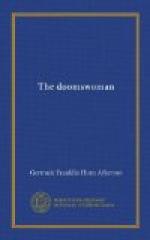“Ay, Dios!" I thought, “it has begun already.”
VII.
The festivities were to last a week, every one taking part but Alvarado and Dona Martina. The latter was not strong enough, the governor cared more for duty than for pleasure.
The next day we had a merienda on the hills behind the town. The green pine woods were gay with the bright colors of the young people. Here and there a caballero dashed up and down to show his horsemanship and the silver and embroidered silk of his saddle. Silver, too, were his jingling spurs, the eagles on his sombrero, the buttons on his colorous silken jacket. Horses, without exception handsomely trapped, were tethered everywhere, pawing the ground or nibbling the grass. The girls wore white or flowered silk or muslin gowns, and rebosos about their heads; the brown ugly duenas, ever at their sides, were foils they would gladly have dispensed with. The tinkle of the guitar never ceased, and the sweet voices of the girls and the rich voices of the men broke forth with the joyous spontaneity of the birds’ songs about them.
Chonita wore a white silk gown, I remember flowered with blue,—large blue lilies. The reboso matched the gown. As soon as we arrived—we were a little late—she was surrounded by caballeros who hardly knew whether to like her or not, but who adhered to the knowledge that she was Chonita Iturbi y Moncada, the most famous beauty of the South.
“Dios! but thou art beautiful,” murmured one, his dreamy eyes dwelling on her shining hair.
“Gracias, senor.” She whispered it as bashfully as the maidens to whom he was accustomed, her eyes fixed upon a rose she held.
“Wilt thou not stay with us here in Monterey?”
She raised her eyes slowly,—he could not but feel the effort,—gave him one bewildering glance, half appealing, half protesting, then dropped them suddenly.
“Wilt thou stay with me?” panted the caballero.
“Ay, senor! thou must not speak like that. Some one will hear thee.”
“I care not! God of my life! I care not! Wilt thou marry me?”
“Thou must not speak to me of marriage, senor. It is to my father thou must speak. Would I, a Californian maiden, betroth myself without his knowledge?”
“Holy heaven! I will! But give me one word that thou lovest me,—one word!”
She lifted her chin saucily and turned to another caballero, who, I doubt not, proposed also. Estenega, who had watched her, laughed.
“She acts the part to perfection,” he said to me. “Either natural or acquired coquetry has more to do with saving her from the solitary plane of the intellectual woman than her beauty or her father’s wealth. I am inclined to think that it is acquired. I do not believe that she is a coquette at heart, any more than that she is the marble doomswoman she fondly believes herself.”




